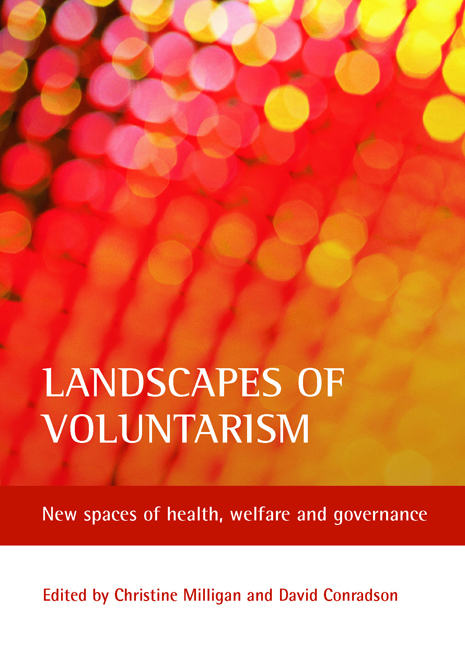Book contents
- Frontmatter
- Contents
- List of tables, figures, maps and plates
- Notes on contributors
- Foreword: Beyond the shadow state?
- one Contemporary landscapes of welfare: the ‘voluntary turn’?
- two A ‘new institutional fix’? The ‘community turn’ and the changing role of the voluntary sector
- three Renewal or relocation? Social welfare, voluntarism and the city
- four Voluntarism and new forms of governance in rural communities
- five New times, new relationships: mental health, primary care and public health in New Zealand
- six Informal and voluntary care in Canada: caught in the Act?
- seven Competition, adaptation and resistance: (re)forming health organisations in New Zealand’s third sector
- eight The difference of voluntarism: the place of voluntary sector care homes for older Jewish people in the United Kingdom
- nine Values, practices and strategic divestment: Christian social service organisations in New Zealand
- ten Faith-based organisations and welfare provision in Northern Ireland and North America: whose agenda?
- eleven Government restructuring and settlement agencies in Vancouver: bringing advocacy back in
- twelve Developing voluntary community spaces and Ethnicity in Sydney, Australia
- thirteen The voluntary spaces of charity shops: workplaces or domestic spaces?
- fourteen The changing landscape of voluntary sector counselling in Scotland
- fifteen Volunteering, geography and welfare: a multilevel investigation of geographical variations in voluntary action
- sixteen Reflections on landscapes of voluntarism
- Index
four - Voluntarism and new forms of governance in rural communities
Published online by Cambridge University Press: 15 January 2022
- Frontmatter
- Contents
- List of tables, figures, maps and plates
- Notes on contributors
- Foreword: Beyond the shadow state?
- one Contemporary landscapes of welfare: the ‘voluntary turn’?
- two A ‘new institutional fix’? The ‘community turn’ and the changing role of the voluntary sector
- three Renewal or relocation? Social welfare, voluntarism and the city
- four Voluntarism and new forms of governance in rural communities
- five New times, new relationships: mental health, primary care and public health in New Zealand
- six Informal and voluntary care in Canada: caught in the Act?
- seven Competition, adaptation and resistance: (re)forming health organisations in New Zealand’s third sector
- eight The difference of voluntarism: the place of voluntary sector care homes for older Jewish people in the United Kingdom
- nine Values, practices and strategic divestment: Christian social service organisations in New Zealand
- ten Faith-based organisations and welfare provision in Northern Ireland and North America: whose agenda?
- eleven Government restructuring and settlement agencies in Vancouver: bringing advocacy back in
- twelve Developing voluntary community spaces and Ethnicity in Sydney, Australia
- thirteen The voluntary spaces of charity shops: workplaces or domestic spaces?
- fourteen The changing landscape of voluntary sector counselling in Scotland
- fifteen Volunteering, geography and welfare: a multilevel investigation of geographical variations in voluntary action
- sixteen Reflections on landscapes of voluntarism
- Index
Summary
Introduction
It is now widely accepted that the way in which the UK is governed has undergone a significant transition since the 1980s, with a system of ‘government’, which emphasised the political monopoly of the state, giving way to a new system of ‘governance’, in which the process of governing is conducted through partnerships, networks and ‘tangled hierarchies’ of public, private and voluntary sector actors, agencies and institutions. Although defined by Stoker (1996) as ‘the development of governing styles in which boundaries between and within the public and private sectors have become blurred’ (p 2), the evidence since the 1980s is that governance arrangements have been as much about engaging the voluntary sector as about engaging the private sector. As Leach and Percy-Smith (2001) note in a more inclusive definition, the process of governing ‘is no longer assumed to involve a single, homogeneous all-powerful government, but rather a shifting combination of public departments and agencies, quasi-public bodies, private and voluntary sector organizations, operating at different but interdependent levels’ (p 22).
The transition towards a new system of governance has hence contributed to the reawakening of a latent tradition of voluntarism within UK political and civic culture. Philanthropy and voluntary action played important roles in establishing and developing public services and facilities during the late 19th and early 20th centuries, including schools, hospitals, social housing, libraries and cultural amenities, and so on (Hunt, 2004). During the 20th century, however, many of these activities were absorbed by the state, driven by two ideological imperatives that formed the basis of the ‘welfare state’: first, the principle of universal provision across the territory of the state, and second, that the delivery of public services should be accountable to elected representatives in either local or national government. While the voluntary sector never entirely withdrew from involvement with public services, its activities largely became confined to more peripheral functions, such as auxiliary support (for example, meals on wheels services), additional fundraising (for example, by hospital leagues of friends), and, increasingly, advocacy activities on behalf of marginalised groups (Brenton, 1985; Deakin, 1995).
The re-engagement of the voluntary sector from the 1980s onwards was initiated as part of a wider restructuring of the state under the Thatcher government.
- Type
- Chapter
- Information
- Landscapes of VoluntarismNew Spaces of Health, Welfare and Governance, pp. 53 - 72Publisher: Bristol University PressPrint publication year: 2006



